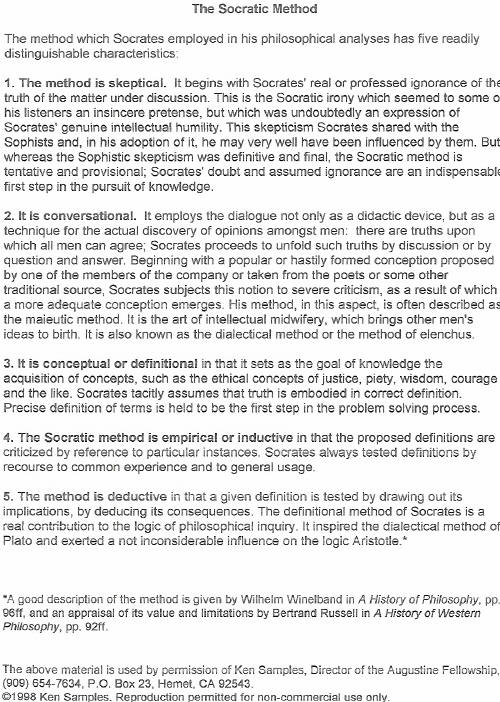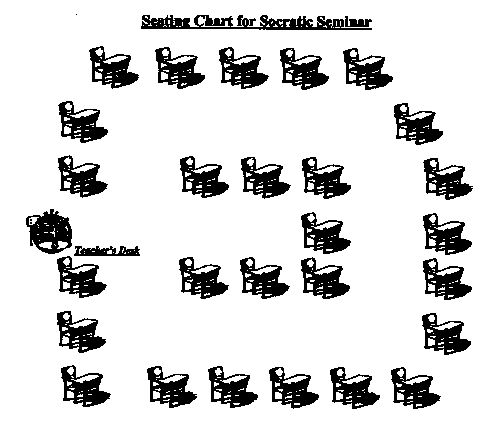
Five Lesson Plans: Lesson Five
| Rationale | Lesson Plan | Documentation | Reflection | Plan & Diversity |
Lesson Five: Socratic Seminar over Frankenstein
Rationale for Socratic Seminar lesson
As educators it is our responsibility to assist student learning, enabling students to reach higher levels of cognitive development. In the same respect, many instructors use the idea of Constructivism as a teaching technique to bring out students learning. Constructivism is a philosophy of learning in which students construct their own learning by use of personal experiences or insight of the way they view the world. The Socratic Seminar has its basis in Constructivism. The Socratic Seminar is based upon Socrates who employed philosophical analysis to subjects of interest. By participating in a Socratic Seminar, students are encouraged to express comments that show originality, deep thinking: beyond the literal, debatable, and supported by the text, state connections to related topics/texts, provides an explanation/argument for what is being said, respond to opposing arguments as well as delve deeper into a previously mentioned issue or topic. The novel, Frankenstein, has many themes that the students can and should explore that relate to modern day political issues (such as cloning), issues that students may relate to in a high school setting (such as being an outcast etc.), and many more. >
I. Unit: Frankenstein
II. Topic: Introduction of Frankenstein
III. Major Concepts and Key Terms:
a. Shelley made literary allusions to Dr. Faustus and Paradise Lost
b. Frankenstein is a Frame Novel.
c. V. Frankenstein sees an early version of himself in Henry Clerval .
d. Key Terms: Frame Novel, Outcasts, Themes
IV. State Frameworks:
W.1.2, W.1.5, W.1.6, W.1.9, R.1.1, R.1.3, R.1.16, R.1.17, R.2.3, LSV.1.1, LSV.1.2, LSV.1.4, LSV.1.14
V. Objectives:
a. While discussing the novel, Frankenstein , students will explain and retell information from the reading with complete accuracy.
b. While discussing the novel, Frankenstein, students will draw conclusions to what they think would happen if sections of the novel were applied to life situations.
c. Given the definition of key terms, students will take the key terms and make connections to the novel, making the definitions of the terms practical.
VI. Anticipatory Set:
a. Students will be engaged in a brief discussion at the beginning of class. The discussion will focus the studentís attention, provide a very brief practice on previously achieved and related learning, and develop a readiness for the instruction that will follow.
b. The discussion: Students will be asked discussion questions by the teacher that will review last periods learning and prepare for the upcoming lesson.
VII. Teacher Input:
a. The teacher will bring the discussion to an end, and ask students to take a few minutes and create original but similar questions covering the themes of the novel, life application questions, universal connections, characterizations, etc. of the novel.
b. Afterwards, the teacher will have students get into the correct class formation for a Socratic Seminar, review the rules for a Socratic Seminar, and pass out Socratic Seminar Observation form.
VIII. Modeling:
a. The teacher will begin the first group off in the Socratic Seminar by asking the first question to them. Then the students will have to ask questions from that point on. The teacher will intervene in the seminar if need be.
IX. Checking for Understanding:
a. The teacher will refer back to major points brought up in the seminar (ask questions and address issues) and points that may have not been mentioned after the seminar is complete.
b. After the class has answered questions and information has been covered, the teacher will assign a journal that will assess students learning for the day.
c. Possible Journal: Illustrate in your writing three major issues that were addressed today. Explain the importance of these issues to the novel and give details supporting your claim.
X. Guided Practice:
a. The teacher will assist students, if need be, during the Socratic Seminar and creating focused discussion questions for the seminar.
XI. Independent Practice:
a. Homework: Students will be required to write a response to the following: Compare Victor Frankenstein with the monster he created. In what ways are their life experiences similar? In what ways are they different.
XII. Closure:
a. The teacher will recap the lesson by having students read their journals aloud and sharing their views or ideas about Frankenstein.
XIII. Texts, Material, and Equipment:
a. Pen and paper
b. Novel, Frankenstein
c. Handouts (Mary Shelley Handout)
d. Highlighters
X. Assessment:
a. Students will be assessed by their homework, journal assignments and mostly Socratic Seminar observation form.
| Socratic Method | Student Sample One | Discussion Questions |
| Seminar Rules | Student Sample Two | Seating Chart |
| Observation Form | Student Sample Three | Lesson Reflection |
Socratic Method
Rules for Socratic Seminar
Worth 30 points
Points are deducted for talking, whispering, breaking rules, or any perceived distractions.
They write their names on form as OBSERVER.
Give the group a time limit (usually 15-20 minutes).
Each student must participate at least 3 times with insightful comments.
If the comments are shallow or do not promote conversation about the topic, that person get no credit for that comment or question.
Outside circle observers will write notes throughout the seminar. They cannot talk and must not try to interfere in any way, not even encouragement or agreement. They are to write any ideas for their own seminar on the back of their observation forms, and they can add to the comments previously made when it is their turn to go to the inner circle.
The entire period determines students' grades, not just how they perform in the inner circle.
Back to Lesson Plan: Teacher Input
SEMINAR OBSERVATION-PARTICIPANT
Observer: ____________________________ Date: ________________
Text: __________________________________________________
Take notes and make comments on how this person participated today.
Participant: _____________________________________________
Contributed relevant information and ideas. Give Examples.
Listened Carefully. Asked questions and/or paraphrased or restated othersí ideas. Give Examples.
Took a position and demonstrated willingness to think it through in Socratic dialogue. Give Examples.
Took a risk. Did he or she try something challenging for him/her? Give Examples.
Other helpful Seminar participation, such as: (please comment)
Referring back to the text for evidence and support.o
o
Speaking directly to other participantso
Speaking clearly and loudly enough to be heard by all.o
Helping other participants out.o
Other
Back to Lesson Plan: Teacher Input
Discussion Questions for the Socratic Seminar
The idea of friendship is a dominant theme in the novel. Examine the idea of
friendship in light of Walton, Victor, and the monster. Were their views of
friendship different? Did they have different qualities they needed in a friend?
Repeatedly the monster says that it was the fault of mankind that he had turned
evil. Do we, as part of mankind, have a responsibility to the outcasts of
society? Who are the outcasts?
Why do you think Mary Shelley subtitled her novel, "The Modern Prometheus"? Read
the story of Prometheus that I posted and draw some conclusions.
At the end of the novel, Victor chases his monster. Why do you think that the
monster leaves food and an obvious trail for Victor to follow? What does the
monster mean by the following quote at the end of the novel? "If thou [Victor]
were yet alive, and yet cherished a desire of revenge against me, it would be
better satiated in my life than in my destruction."
Do you think that it was Victor's fault that the monster turned bad? Should he
have made a female monster as a companion? What do you think would have happened
to Victor's mind and peace had he made the female?
What responsibility do you feel the creator bears for his creation and for the
actions of his creation? Consider this question on many levels-God and man, God
and angels, man and his children, man and his inventions (nuclear weapons,
cloning, viruses, etc.), and so on.
How does Walton's journey (the purpose, the destination, his desires) parallel
the story of Frankenstein and his monster?
The idea of nature and God's creation being a restorative to the soul is
mentioned again and again. Consider these quotes "The sight of the awful and
majestic in nature had indeed always the effect of solemnizing my mind, and
causing me to forget the passing cares of life." (Chapter 10) "The pleasant
sunshine, and the pure air of day, restored me to some degree of tranquility."
(Chapter 16) "But the fresh air and bright sun seldom
failed to restore me to some degree of composure." (Chapter 18) Why do you
think Shelley set up the contrast of one creation being a restorative and
another being a curse? Symbolically, what did going to a land of ice mean to the
monster and to Victor? How is this nature compared/contrasted to the snow and
ruggedness of Switzerland?
Back to Lesson Plan: Teacher Input

Back to Lesson Plan: Teacher Input
Student Sample Work One
Student Sample Work Two
Student Sample Work Three
LESSON REFLECTION
Teacher Candidate Carleton H. Brown Grade/Subject 12th Ė AP English
Lesson Topic Frankenstein/ Socratic Seminar Date 11-03-2003
Learning Goals/Objectives: To what extent were the goals met? How do you know?
All the objectives were met. Students literally did the objectives during the seminar. For instance, they showed their knowledge, recall of information, drew conclusions, and applied information to life situations.
Student Grouping: How would you group students for similar instruction in the future? Why?
I would definitely continue to put students in a circle for this activity. Being in a circle, students are able to look at each other and get a feel for being apart of the active discussion. I alternate from having a small circle with a large circle versus just having a large circle. Each option has it advantages; however, I find it easier to switch it up when dealing with different class personalities. One class may have students who find it hard not to participate while a discussion is going on and such a class should utilize the large circle where everyone has the chance to communicate at any time (this option is great for AP students). While another class may have students that are intimidated by a massive discussion and such a class should utilize taking turns within a small circle while those in the large circle observe (this option is useful for the pre-AP students).
Methods & Materials: In what ways were your methods and materials effective? What changes would you make for future instruction?
Studentís levels of intelligence of the material were elevated on Bloomís taxonomy. I posed different levels of intelligence questions to students, and encouraged students to do the same. I also assisted students in coming up with solutions and encouraged them to come up with solutions individually and as a class without the teacherís assistance. Their responses showed scholarly merit. One change I would have made for this lesson, would be to have students come to class with questions of their own already formulated as well as to think of questions throughout the discussion.
Activities: In what ways were your activities effective? What changes need to be made?
The activity was very successful in getting the students motivated to learn, take ownership in their learning, and made learning fun. I believe changes should only be made depending on the class (as stated in previous statements Ė such as the arrangement of the class or allocating variant time for students to come-up with questions of their own).
Evaluation: Have your plans for evaluating student learning changed? If so, how? How will you use the information gathered from the evaluation to plan future instruction?
I would not say that my plans have necessarily changed, but they have increased. As time goes on, I notice more and more things that I could do as far as planning that I may have not thought of before actually teaching the lesson. One such thing in this lesson would be class arrangement.